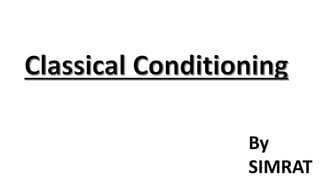
Classical conditioning
- 1. By SIMRAT
- 2. --Born Sept 14, 1849 --Died Feb 27, 1936 --Born in Russia --Physiologist, psychologist, and physician --Awarded the Nobel Prize in Physiology or Medicine in 1904 for research on the digestive system
- 3. Classical conditioning was the first type of learning to be discovered and studied within the behaviorist tradition. Conditioning is a kind of response build up through repeated exposure. The major theorist in the development of classical conditioning is Ivan Pavlov, a Russian scientist trained in biology and medicine . Pavlov was studying the digestive system of dogs and became intrigued with his observation that dogs deprived of food began to salivate when one of his assistants walked into the room. He began to investigate this phenomena and established the laws of classical conditioning
- 4. Conditioning -- a stimulus that initially produces no response can acquire the ability to produce one. Learning occurs through pairing in time and place of one stimulus with another stimulus that produces a response. This is a kind of associative shifting, but the response is involuntary. The classical conditioning theory is based on the assumption that learning is developed through the interactions with the environment. Also, the environment shapes the behavior and internal mental state such as thoughts, feelings, emotions do not explain the human behavior.
- 8. An organism learns to transfer response from one stimulus to a previously neutral stimulus. Classical conditioning is comprised of four elements: Unconditioned Stimulus (US): Which invariably causes to react in a way. Unconditioned Response (UR): Takes place when the US is presented. Conditioned Stimulus (CS): The object that does not bring about the desired response Conditioned Response (CR): a particular behavior that an organism learns to produce, when the CS is presented.
- 9. Classical conditioning (also known as Pavlovian or respondent conditioning) refers to a learning procedure in which a biologically potent stimulus (e.g. food) is paired with a previously neutral stimulus (e.g. a bell). It also refers to the learning process that results from this pairing, through which the neutral stimulus comes to elicit a response (e.g. salivation) that is usually similar to the one elicited by the potent stimulus.
- 10. Acquisition – This is the initial stage of learning when a response is first established and gradually strengthened. A neutral stimulus is repeatedly paired with an unconditioned stimulus to get a conditioned response. Stimulus generalization – stimuli like the CS become able to evoke the conditioned response. Extinction – if the UCS and CS are not paired, the CS loses its ability to produce a conditioned response. Spontaneous recovery – an extinguished CS briefly returns but quickly goes away again.
- 11. Figure 8.4 Acquisition, Extinction, and Spontaneous Recovery. Acquisition: The CS and the US are repeatedly paired together and behaviour increases. Extinction: The CS is repeatedly presented alone, and the behaviour slowly decreases. Spontaneous recovery: After a pause, when the CS is again presented alone, the behaviour may again occur and then again show extinction.
- 12. • Fear, love towards a particular subject is created through conditioning. • A teacher, method of teaching or harsh treatment of his students, create strong dislike among them towards subject. • The theory of classical conditioning emphasizes that the students should be exposed to positive stimuli in order to develop desirable habits, interest and attitudes in them.
